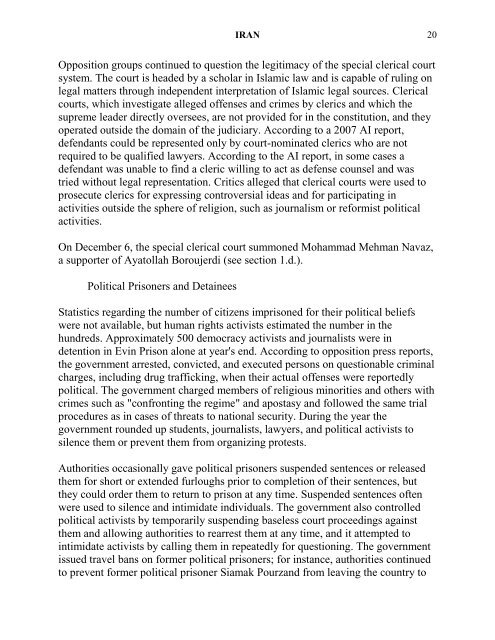IRAN* The Islamic Republic of Iran, with a population of ...
IRAN* The Islamic Republic of Iran, with a population of ...
IRAN* The Islamic Republic of Iran, with a population of ...
You also want an ePaper? Increase the reach of your titles
YUMPU automatically turns print PDFs into web optimized ePapers that Google loves.
IRAN<br />
Opposition groups continued to question the legitimacy <strong>of</strong> the special clerical court<br />
system. <strong>The</strong> court is headed by a scholar in <strong>Islamic</strong> law and is capable <strong>of</strong> ruling on<br />
legal matters through independent interpretation <strong>of</strong> <strong>Islamic</strong> legal sources. Clerical<br />
courts, which investigate alleged <strong>of</strong>fenses and crimes by clerics and which the<br />
supreme leader directly oversees, are not provided for in the constitution, and they<br />
operated outside the domain <strong>of</strong> the judiciary. According to a 2007 AI report,<br />
defendants could be represented only by court-nominated clerics who are not<br />
required to be qualified lawyers. According to the AI report, in some cases a<br />
defendant was unable to find a cleric willing to act as defense counsel and was<br />
tried <strong>with</strong>out legal representation. Critics alleged that clerical courts were used to<br />
prosecute clerics for expressing controversial ideas and for participating in<br />
activities outside the sphere <strong>of</strong> religion, such as journalism or reformist political<br />
activities.<br />
On December 6, the special clerical court summoned Mohammad Mehman Navaz,<br />
a supporter <strong>of</strong> Ayatollah Boroujerdi (see section 1.d.).<br />
Political Prisoners and Detainees<br />
Statistics regarding the number <strong>of</strong> citizens imprisoned for their political beliefs<br />
were not available, but human rights activists estimated the number in the<br />
hundreds. Approximately 500 democracy activists and journalists were in<br />
detention in Evin Prison alone at year's end. According to opposition press reports,<br />
the government arrested, convicted, and executed persons on questionable criminal<br />
charges, including drug trafficking, when their actual <strong>of</strong>fenses were reportedly<br />
political. <strong>The</strong> government charged members <strong>of</strong> religious minorities and others <strong>with</strong><br />
crimes such as "confronting the regime" and apostasy and followed the same trial<br />
procedures as in cases <strong>of</strong> threats to national security. During the year the<br />
government rounded up students, journalists, lawyers, and political activists to<br />
silence them or prevent them from organizing protests.<br />
Authorities occasionally gave political prisoners suspended sentences or released<br />
them for short or extended furloughs prior to completion <strong>of</strong> their sentences, but<br />
they could order them to return to prison at any time. Suspended sentences <strong>of</strong>ten<br />
were used to silence and intimidate individuals. <strong>The</strong> government also controlled<br />
political activists by temporarily suspending baseless court proceedings against<br />
them and allowing authorities to rearrest them at any time, and it attempted to<br />
intimidate activists by calling them in repeatedly for questioning. <strong>The</strong> government<br />
issued travel bans on former political prisoners; for instance, authorities continued<br />
to prevent former political prisoner Siamak Pourzand from leaving the country to<br />
20

















